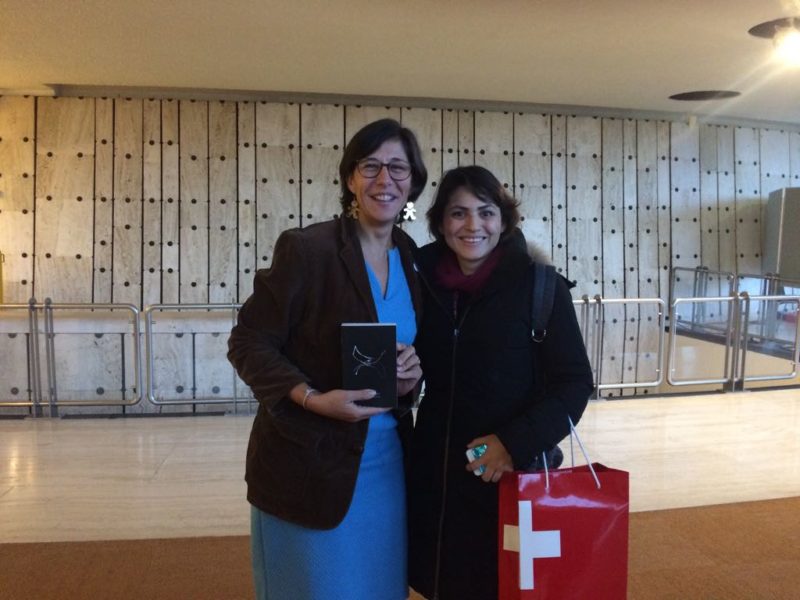The Internet Governance Forum (IGF) is convened under the auspices of the United Nations and holds annual meetings. It is an important event because it brings together various Internet governance stakeholder groups to talk about their activities, hold debates, plan for future projects and have intra-stakeholder group dialogue. Although the IGF meetings do not yield any binding outcomes and are civil society dominated, they provide the rare opportunity of gathering various stakeholder groups in one place and giving the United Nations the pleasure of hosting a diverse, non-hierarchical community.
This blog post showcases some of the activities of IGP at IGF 2017. At IGF, IGP pursued its focus on civil society engagement, digital trade, online content regulation and Internet of Things.
The civil society day
As is customary, various civil society groups and digital rights activists get together two days before IGF to prepare themselves for IGF but also to discuss and debate Internet governance issues. At the joint civil society meeting, we were featured in a debate on economic nationalization and digital trade. Civil society activists who favor trade agreements that liberalize digital services exchanged views with those who think digital trade agreements are inimical to privacy rights. IGP is of the opinion that trade agreements can be a vehicle to advance Internet rights, especially to combat data localization laws, and can even be leveraged to improve privacy protection. Some argue that e-commerce chapters in intergovernmental trade agreements encroach upon Internet governance issues that are now resolved through multistakeholder processes. This concern is not very well backed up, however. The issues addressed in trade agreements have never been resolved by multistakeholder processes. Privacy protection has become a national issue and many governments have passed data localization measures already. It is time to find effective avenues to address these issues.
IGP also presented its paper on domain name registrars and their terms of service, as a part of a broader session about private regulation on the Internet. Our paper was written after a white supremacist website’s domain was cancelled by GoDaddy based on a terms of service prohibition on “immoral” use of a domain. Our paper surveyed the morality provisions in terms of service of registrars. We are still working on the idea of registrars’ neutrality when it comes to content regulation issues in domain names. The topic of domain names and content regulation was also taken up by a workshop organized by the ICANN Noncommercial Users Constituency. IGP was represented on this panel.
IoT Security, will regulation save the day?
During IGF, IGP organized a workshop on IoT security, titled “IoT security: Will regulation save the day?” The workshop was a debate between those who are for greater regulation of IoT security and those who are against it, and think current practices can resolve IoT security issues. The panelists discussed the definition of regulation when it comes to IoT, considered product liability in IoT and debated who we are going to regulate and what are we protecting, consumers or networks? We will do a report on the outcome of the workshop soon. In the meantime, watch the session video and read a paper IGP co-authored with the R Street Institute.
Digital Trade
The last day of IGF, we participated in a main session about digital economy and trade at IGF. Along with Dr. Badiei from IGP, the main session included government representatives, international organizations such as UNCTAD and Internet corporations such as Facebook. IGP contributed to the main session in the first segment, arguing that WTO has not been proactive in facilitating digital trade and that trade agreements might have positive effects for combating data localization. Video is available here:
And we had a booth!

IGP had a booth at IGF 2017 and we raised awareness about our digital free trade project which you can read more about here. We also told IGF participants about our research and activities at IGP. To stir things up and make the booth more exciting, we had a contest. The IGF attendees who answered the Internet governance questions correctly could win a signed copy of the book ‘Will the Internet fragment?’ by Milton Mueller. Only three contestants answered all the questions correctly (a significant portion of quiz-takers thought that Milton Mueller was a co-founder of the IETF). Unsurprisingly, one of the winners was Ian Brown, an Internet governance expert.
In 2018, we will continue our activities and research on digital trade, online content regulation, IoT security, cybersecurity and other emerging Internet governance issues. Stay tuned and let us know what you think about our work!
